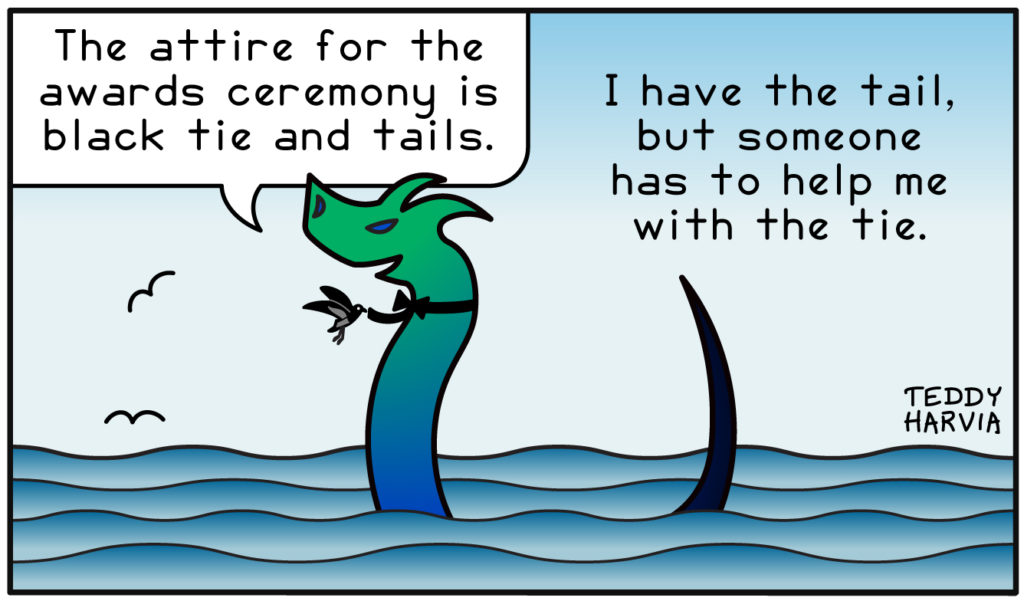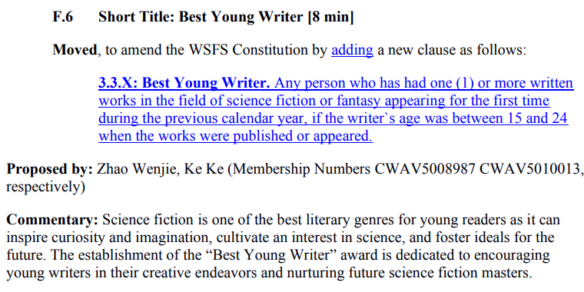
Introduction: I’m going to open discussion of some of the proposed WSFS rules changes in the Chengdu Worldcon’s Business Meeting agenda by setting the table in a series of topical posts. (Download the English-language version here and the Chinese-language version here.)
Four proposals to add Hugo Awards categories are on the Chengdu Worldcon Business Meeting Agenda, one passed on from Chicago 8, and three presented for the first time. This post discusses the motion from Zhao Wenjie and Ke Ke to add a “Best Young Writer” Hugo.

DISPOSING OF THE AUTOMATIC OBJECTIONS. Whenever a new category is proposed someone argues there already are too many Hugos, which to me sounds like the “too many notes” complaint in Amadeus. However, objection noted.
My own bias is to be skeptical about proposed categories that move the focus of the Hugos away from text sff fiction. That is not a problem with the Best Young Writer category.
DOES IT DUPLICATE THE COVERAGE OF AN EXISTING CATEGORY? But there is a question of whether the proposed category competes with an existing Worldcon award. Not another Hugo, but the Astounding Award.
There has never previously been a Hugo category for “Young Writer” with a specified age range, but there is history with a comparable award. Three times in the first decade of Hugo history committees ran variations on a Best New Author category to recognize writers who had recently broken into the field.
1953 – New Discovery. “Author or artist with little or no work published before August, 1952, who has contributed most significantly to stf this past year.” Philip Jose Farmer won.
1956 — Most Promising Author. There were four finalists – Harlan Ellison, Frank Herbert, Robert Silverberg and Henry Still. Silverberg won.
1959 — Best New Author of 1958. The finalists were Brian Aldiss, Paul Ash (aka Pauline Ashwell), Rosel George Brown, Louis Charbonneau, and Kit Reed. The plurality of voters went with “No Award”. There was never another attempt to run this Hugo category.
How old were the two authors who won? In 1953 Philip Jose Farmer was 35 years old. In 1956 Robert Silverberg was 21 years old — in the center of the age bracket proposed for the Best Young Writer category.
CAMPBELL/ASTOUNDING AWARD. Although the Worldcon dropped the Hugo category, in 1973 it agreed to administer voting on a sponsored non-Hugo, the John W. Campbell Award for Best New Writer (renamed in 2020 the Astounding Award).
The Astounding Award for Best New Writer goes to the best new science fiction or fantasy writer whose first work of science fiction or fantasy was published in a professional publication in the previous two years.
CONCLUSION. Hugo history and the coverage provided by an existing award are two factors that Business Meeting voters might consider. Do any other factors come to mind?
Discover more from File 770
Subscribe to get the latest posts to your email.

The overlap with the Astounding strikes me as the big problem. That and that there are already too many categories to assess properly already.
This does seem to have overlap with the Astounding Award.
On first blush, my other big concerns would be:
1. What will the maximum age be?
2. How will the age of nominees be verified and used without running afoul of privacy and identity theft issues?
As someone who fought LONG and HARD for a Young Adult Book category for nearly a decade, my only observation is that if a Hugo Award category for Best Young Writer is approved and ratified, the Lodestar Award had damn well better be abolished and promoted to a full fledged Hugo category, as it should have been in the first place…
Chris B.
The Astounding award, which used to be named after an editor who mentored writers trying to break into the field, is a relic from the time when the aspiring writer would unsuccessfully submit to the handful of markets over and over again for years and frame the rejection letters when famous editors started replying with personalized ones. After years improving their craft through this process, they could come out with guns blazing.
Now that any schmoe can publish schlock on the internet, there is behind-the-scenes rules lawyering and moving of goalposts to try and produce a list of eligibile writers which appears somewhat superficially similar to the old days. (Was the publication whitelisted by SFWA? did they pay seven cents a word, or eight? etc.) That’s not in the spirit of the Hugo Awards Ceremony.
Honoring young writers is much more important.
Cut the Astounding adrift, replacing it with a Hugo for Best Young Writer.
They could have run this as a special Hugo this year, to demonstrate that it filled a niche that needed filling.
This strikes me as a horrible idea for a Hugo. The quality that most readers who care about Hugos expect when they see “Hugo finalist or Hugo winner” is rarely going to be met just due to most writers’ natural development cycle. It will dilute the value of the other Hugos even more than they are now.
The number of Hugo voters that are likely to be aware of both age and qualifying publications for authors in the 17 to 24 year age group is I would estimate probably even lower than some of current lowest performing categories as to number of nominations, limiting its representativeness and reasonableness.
I really don’t like this proposal. A lot of the successful nominees will get onto the ballot because of boosterism by relatives and friends. The winner will then be the one with the most charming personality as shown online and at conventions. At least with the Astounding Award, even more so for the Lodestar, there is an emphasis on actual product. This proposal is just about awarding a particular kind of person for being who they are.
I’m definitely far from the best person to provide any sort of reliable context on this proposal, but a couple of observations:
The proposers are involved in a “University Science Fiction” project, which aims to encourage teenagers/students to write SF. I think this is the website for that project, or at least part of their online presence.
My perception is that in the Chinese SF scene, student SF clubs and writing competitions are a much bigger part of the ecosystem, compared to the Anglosphere or west. I think that Chinese fanzines are also more fiction oriented than their western equivalents, based on a comment I read from RiverFlow, editor of the (non-fiction) Zero-Gravity SF ‘zine that’s a Hugo finalist this year.
If the existing Hugo categories could be said to be based on a Western/Anglo idea of how SF publishing and fandom operates, then I don’t think it’s surprising that people in China are proposing new categories based on how things work there.
I’m not super-familiar with the details of the Astounding Award, but I suspect many of the candidates for this hypothetical Young Writer Award wouldn’t be eligible for the Astounding, as their work doesn’t qualify for it. (Similar to how Everina Maxwell’s first novel is a revised version of something she published on AO3 several years ago, but that didn’t affect her Astounding eligibility last year and this.)
Hopefully someone who is more knowledgeable on this stuff can correct any misinformation I’ve written here. In the meantime this 2022 article by the aforementioned RiverFlow might be helpful in providing context.
Clicky
Ageism.
These are writers living in 17 to 24 year old bodies, operated by 17 to 24 year old brains.
Do they really need another prize?
ISFDB knows eight writers with a listed birth year of 1998 or later and a fiction publication in 2022. This is obviously very incomplete (both dates and publications), but it looks like not nearly enough writers and works of quality for a Hugo.
Before seriously considering this proposal I would like to see some eligibility lists from past years as well as a trial run as Special Hugo.
Otherwise, no.
This is a fan and early career award. It neither rewards nor punishes you for selling a work or series to a tradpub fiction market or, here in the 21st century, using a monetization platform or selling your IP to a production company.
When I read a work of science fiction or fantasy, I usually don’t pay attention to the age of the writer. This could be a hard one to get a good number of nominations.
How many people have written Hugo-worthy work before the age of 25?
Mary Shelley did, of course, but it is not common.
Asimov published “Nightfall” in 1941. He was born in 1920.
I suspect that some writers–old and young– are not going to want to publicize their age. Both because of privacy issues, and, perhaps out of a concern that it might limit their market.
That’s not enough to make me oppose this, but it is an issue to consider.
But I can’t support this as a permanent category when it’s completely untested! I don’t really think any new Hugo category should be added without a trial run!
I do not want a Hugo Award that requires verifying personal info of the candidates. I really don’t want to put minors in the spotlight–something they have no ability to refuse–and I don’t like placing a permanent record of someone’s age (within a few years) in prominent spots on the internet.
Any Hugo that requires doxxing should be voted down. Any Hugo based on criteria that employers aren’t allowed to ask for, should be voted down. We should not have Hugo Awards based on age, race, gender, sexual orientation, religion, national origin, ethnic background, disability, or family status.
(Or, for that matter, residence, personal hobbies, education level, or zodiac sign.)
This category can also overlap with “Best Fan Writer,” as it doesn’t specify whether the person’s writing is published for profit.
…All of the 4 new Hugo Award proposals are, at best, badly written and fail to cover the necessary details to implement them.
I remember when I lost the Campbell Award in 1996, David Feintuch, who won, made a joke at his speech about being glad that it wasn’t an award for best young writer. as he was 52 (IIRC) when he won it.
If there will be an award for best new young writer, why not one for best new old writer, for someone who first publishes SF in their 50s or older?
I concur that this duplicates the Campbell / Astounding Award.
Further, it is most certainly ageist! (And not inclusive.)
Some writers come to SF late in their career. I don’t know how old Carl Sagan was when he wrote Contact but am pretty sure that when he wrote his first novel he was over 24 and so would not have been eligible for this proposed new Hugo.
Indeed, many brilliant writers had their first book published when they were well over 24 years of age. Alastair Reynolds is one such. If memory serves (I may be in error and so am happy to be corrected), he had completed his university career and had a few years working as an astrophysicist for ESA before his first novel came out.
Terry Pratchett was another. Yes, he had shorts published in a newspaper but I am pretty sure he was over 24 when his first book came out.
It is often better for writers to practice and hone their craft first. Such an award for young writers (as opposed to those who have had their first novel out) would be bound to drive the standard of short-listed works downwards.
This is a terrible proposal.
(Besides, if we could have a new category of Hugo, I’d (and some friends would) like it to be for Best Fantasy novel.)
@Michael A. Burstein Totally agree.